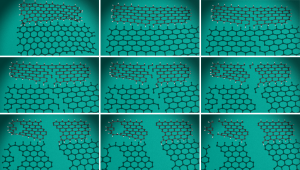Yesterday, after 15 years a new official release of GROMOS (in C++) has seen light of the day. All informations are available on this website: www.gromos.net
GROMOS11 relies on 30 years of scientific research for biomolecular simulation (soft matter). Primarily, in contrast to other packages it has to suit the needs of the scientific community.
The models (force-fields) have been further developed over decades and are highly specialised for proteins, sugars and lipids. In contrast to simpler models, they are fitted on experimental thermodynamical data of liquids and not on structures in vacuum.
We from xirrus have developed with GROMOS96, respectively worked on its models earlier and own a life long license.
Author: xirrus simulation
Tensile strength of polymer
Organic molecules, such as polymers or biopolymers can partly cover enormous tensile strengths. In the shown example of a graphene nanoflake, which has been tested on tensile strength, it has been more than 250 times bigger than for steel!

This strong property shall be used in a composit material, to substantially change its properties compared to the pure material.
The strength of the molecule has its origin in the chemical bond. Material cracks do not open normally within molecules, but between molecules. Therefore the intermolecular forces are an important part of the models. It is possible, to check virtually polymers or its composits on the tensile strength without knowing the macroscopic material properties in advance.
Let identify material properties in advance
Let identify material properties online now, before synthesis or production, simple and less expensive!
- density in [kg/m3]
- viscosity (shear viscosity) in [N·s/m2]
- heat capacity in [kJ/mol/K]
- thermal conductivity (assumption: isotropic) in [kJ/m/K/s]
- diffusion coefficient in [cm2/s]
- compressibility (isothermal) in [kJ/mol/l]
- elasticity module in [kN/mm2]
Order here: xirrus simulation matters
